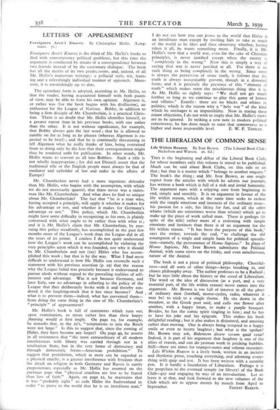THE LIBERALISM OF COMMON SENSE Tits is the beginning and
debut of the Liberal Book Club, for whose members only this volume is stated to be published. Much can be said about Book Clubs, on this side or on that ; but that is a matter which " belongs to another enquiry." The book's the thing ; and Mr. Ivor Brown, as one might expect from the articles with which he adorns our journals, has written a book which is full of a rich and jovial humanity. The argument runs with a tripping ease from beginning to end, simply and sensibly. It is an argument in favour of the life within reason, which at the same time seeks to reckon with the simple emotions and instincts of the ordinary man— his passion for a side, his liking for fun, and all the other whims (which are sometimes worse than whims) which go to make up the piece of work called man. There is perhaps (in spite of the title) rather more of a reckoning with simple emotions and instincts than there is of an argument for the life within reason. " It has been the purpose of this book," says the writer, towards the end, " to challenge the old assumption of a single and simple basis for political specula- tion—namely, the permanence of Homo Sapiens." In place of Homo Sapiens, Mr. Ivor Brown substitutes the Political Animal, with some stress on the frisky, and even mischievous, nature of the Animal.
The book is not a piece of political philosophy. Cheerful- ness—and all sorts of other things—keeps breaking in, and chases philosophy away. The author professes to be a Radical ; but he says little about the history or the creed of Liberalism. The word or the idea of discussion (as a part, and a very essential part, of the life within reason) never enters into the argument. Mr. Brown is too full of interest in all the ploys of ordinary men (football, motor-cycles, radio, whatever it may be) to stick to a single theme. He sits down in the meadow, as the Greek poet said, and culls one flower after another, with a happy heart, to make a purple bouquet. Besides, he has the comic spirit tingling in him ; and he has to have his joke and his epigram. This makes his book delightful reading ; but it also makes it disjointed, and amusing rather than moving. One is always being tempted to a happy smile or even to hearty laughter ; but what is the upshot? Mr. Brown may ask, Ridentem dicere verum quid vetat? Indeed, it is part of his argument that laughter is one of the allies of reason, and can do yeoman work in pricking bubbles. Still—there are times for trumpet-notes and solemn recorders.
Life Within Reason is a lively book, written in an incisive and rhythmic prose, touching everything, and adorning every- thing with quip and jest. It has been written with a running pen. It is hardly a foundation of Liberalism. Perhaps it is the propylaea to the eventual temple (or library) of the Book Club—gay and engaging by way of an introduction. Let us leave it at that, and look forward to the new volumes of the Club which are to appear month by month from April to


























































 Previous page
Previous page